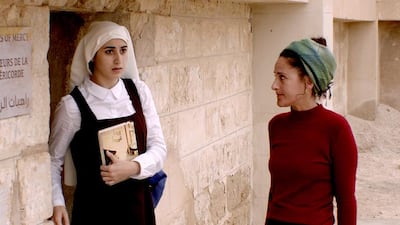Ave Maria director Basil Khalil was in an understandably upbeat mood when we caught up with him ahead of his film's premiere at the Cannes Short Film Competition.
Even before the film had been screened at the festival, it had been picked up for broadcast on French TV by Canal+, and by two distributors – Canada’s Ouat Media and MAD Solutions in the Middle East.
It’s rare for a short film to generate such interest, with few reaching an audience beyond the festival circuit, and so Khalil was clearly excited.
“It was crazy after the announcement that we’d been picked up – I’ve barely slept since,” he says. “Luckily I have two producers, one very technical and one good with contracts. I’m good at festivals and work part time as a festival coordinator, so we’ve been able to delegate.
“We’ll still be going around the world to festivals, hopefully winning lots of awards and hopefully getting more TV stations interested. They probably only buy around 20 shorts a year, so festival success is crucial.”
The film is a quirky comedy set in the Palestinian Territories. It tells the story of a family of Israeli settlers who crash into a statue outside a nunnery as they rush home for Sabbath. Stranded with a broken-down car, they are unable to operate telephones or machinery to call for help, due to the rules of their religion. The nuns in the monastery, meanwhile, have taken a vow of silence, and the film shows, in a humorous way, how the two groups, initially suspicious and distrusting of each other, manage to work together to find a solution.
It's not the first time that Khalil – whose father is Palestinian and whose mother is British – has found a humorous way to explore the situation in Palestine; his 2005 film Ping Pong Revenge was a satirical look at the misery each side has inflicted on the other.
The director feels it is important to bring a humorous perspective to an otherwise incredibly bleak situation.
“It’s definitely important to see another side of Palestine,” he says. “Palestinians have a very good sense of humour – and anyone who suffers around the world has always developed a good sense of humour to alleviate the pain and suffering they go through.
“The film is talking about an absurd situation that could happen any day in Palestine, but if you take a step back it’s actually hilarious. The nuns are living under an occupation of Palestine, but also under the occupation of the rules of their order, the vow of silence.
“Then you have the settlers, who are the occupiers but they’re also occupied by their rules of the Sabbath – so when these conflicting rules meet, they actually learn that the rules really aren’t that much of a life-and-death situation.
“When you’re not bound by those rules, you can look at them objectively and say: ‘That’s a bit silly.’”
Khalil grew up in Nazareth, where his father was an evangelist preacher, before studying film in the United Kingdom and spending several years working for the BBC, including on the popular Jamie Oliver cookery shows.
Ave Maria is very much a product of his upbringing – and with films such as May in the Summer and the Open Bethlehem project shining a light on the lives of Christians in the Middle East, Khalil agrees that cinema can be a useful tool for educating international audiences.
“Christians in the Middle East have suddenly come on to the international agenda because of what’s been happening, and people are suddenly saying: ‘Hang on’ – they’re not sure what to do.
“The news outlets don’t want to demonise us like they so often do when reporting the Middle East, so now they’re making us victims – but in fact we’ve always been there, we’ve never been segregated and we’ve never felt the need to make our presence known.
“Now when western audiences see nuns walking down the street in Palestine they do a double take, but that’s been normal for us. When you put it in a film and it shows around the world, people notice.
“It can be a useful tool for education, though, unfortunately, it doesn’t really suit the US oil agenda to recognise these things, so they’ll no doubt keep us for when they need us for something else.”
With Ave Maria about to reach a wider, global audience, Khalil hopes it will serve as a calling card for two feature films he has in development.
One, A Gaza Weekend, has already been featured at filmmaking labs at the Torino and Sundance festivals, but the director concedes that it is probably a little too ambitious for him to attract funding with his current CV.
Instead, he is focusing on a “more intimate” foodie film, “harking back to my time working with Jamie Oliver as well as my own love of food”.
With hard-hitting documentaries about Palestine for Al Jazeera in his portfolio, too, Khalil is certainly nothing if not diverse, and it will be worth keeping an eye on his future work.
cnewbould@thenational.ae

